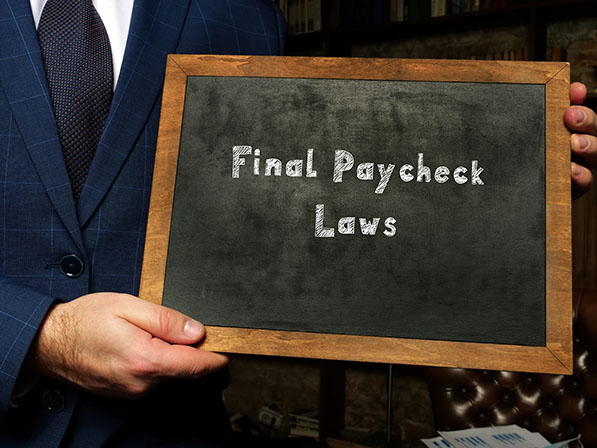If an employee quits without giving any notice, I believe I have a window of time to prepare a final paycheck. Does the employee have to come pick it up or should I mail it to them?
When an employee quits without any notice at all, you have 72 hours to cut a final paycheck and have it ready for them to pick up. If an employee gives less than 72 hours’ notice, you have 72 hours from the time notice is given to have the check ready. The 72 hours runs regardless of business hours. It generally is the responsibility of the employee to return to pick up their check or request that it be mailed.
Some of the most common questions about final paychecks in this situation are:
Where should the check be for the employee to pick up?
A final paycheck must be available for them to pick up “at the office of the employer within the county in which the work was performed,” according to California Labor Code Section 202.
So, for example, an employee who works at a Northern California branch of your company could not be required to travel to your Southern California branch where your payroll is done to pick up a final paycheck. You would need to make sure it was available for the employee to pick up at the Northern California branch by the 72-hour deadline.
What if my payroll is done out of state and I can’t get a check in time?
Unfortunately, there is no exception to the 72-hour rule based on where your payroll is done, so if the check is late, you would be subject to waiting time penalties of a day’s wages for every day it is late up to 30 calendar days.
What if an employee doesn’t come to pick up their final paycheck?
Often an employee will not return to pick up a check, in which case an employer might wonder if they need to eventually mail it to the employee.
California law is clear that the final paycheck should be mailed to an employee who quits only if the employee specifically requests that it be mailed and also designates a mailing address.
If the employee does not come in to pick up their final paycheck and never requests that it be mailed, should I mail it anyway just to be sure they get their wages?
No. If you drop it in the mail and then the employee comes in to pick up the check before it arrives at the employee’s home, you will be liable for penalties for late wages for every day the employee then has to wait for the check to arrive.
In addition, if you don’t have a current address on file, the check may go to the wrong address and cause even further penalties to accrue.
If an employee requests that I mail the check, does it have to arrive at the employee’s home within 72 hours?
No. The date of the mailing is considered the date of payment for purposes of the requirement to provide payment within 72 hours of the notice of quitting. So as long as the check is mailed on time, there is no legal violation even though it may take several days in the mail to reach the employee’s home.
First class mail is considered sufficient for mailing, although some employers may choose to use a form of delivery that provides proof of receipt.
What if an employee is working remotely from their home in another county?
The law on final paychecks simply says the check must be available at the office of the employer within the county in which the work was performed — and does not address remote workers.
If an employee is working from home in a different county than the one where the employer is located, it’s unclear where the final check would need to be. However, an employer could ask the employee if they would simply like the check mailed to avoid any issues.
What if the employee has given more than 72 hours’ notice, or if we have terminated them or laid them off?
Note that the above mailing rules do not apply when an employee quits with more than 72 hours’ notice, in which case the wages are due on the last day of work. These rules also do not apply when an employee is terminated or laid off, in which case the wages are due at the time and place of termination or layoff.
Ellen Savage, HR Adviser, CalChamber
CalChamber members can read more about Final Pay in the HR Library. Not a member? See how CalChamber can help you.



